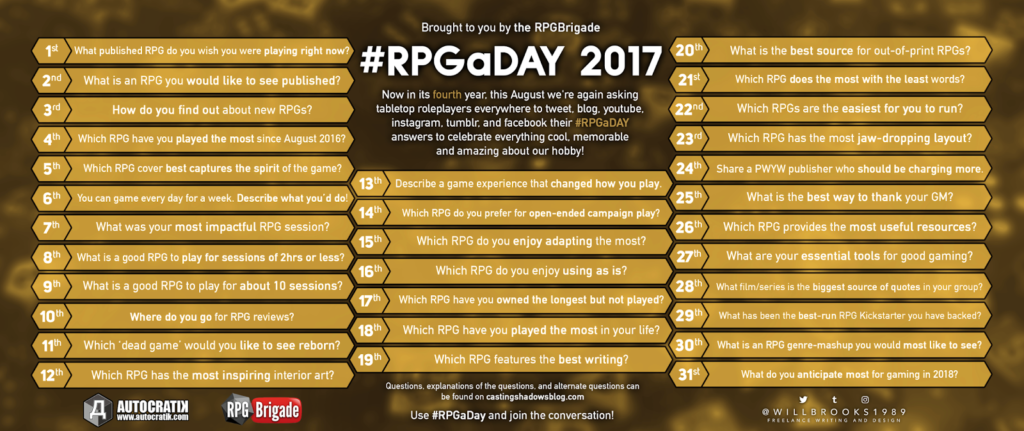This post is a part of the #RPGaDAY series for 2017 by David F. Chapman and RPGBrigade. For more information, see this post at AUTOCRATIK. I'm modifying per suggestions from S. John Ross as well as applying my own interpretations. Comment with your answers or links to your own posts!
Day 4 - Which RPG have you played the most since August 2016?
This question, as originally written, posed a bit of a conundrum for me for a few reasons. One, certainly, I don't have the time to play as much as I want to. Two, the majority of what I do play are one-shots, and I'm always trying out new games. Three, I don't really keep track of what I play, though this is making me wonder if I should maybe change that. Four, I play a lot of playtests for games that are still in development, and I had wanted to answer this question with a game that's published and available. So with all that, I'm invoking one of the S. John Ross modifications and removing the superlative. So instead of naming what I've played the most of in the last year (which I'm not even sure I could reliably do), I'll instead talk about a game I remember being very happy to play in the last year!
Microscope by Ben Robbins (Lame Mage Productions) is something that I loved immediately upon reading, but that took me a long time to finally play. It bills itself as "a fractal role-playing game of epic histories," which makes a lot more sense once you're familiar with the game. It is a "role-playing game" in the vaguest sense; for the times players do assume the roles of characters, those characters are often transient and even if not, seldom get a chance for much in-depth development. The focus of the game, instead of being the characters, is an entire historical timeline. Over the course of play, this timeline is divided into large chunks, each of which is divided into smaller chunks (hence the "fractal" part of the game), and various pivotal scenes from throughout this history are enacted. Beyond thinking of this as a storygame, I also think of it as a worldbuilding game, and I do love me some worldbuilding games. As such, it also functions well as an add-on to any other RPG you might want to play, particularly as part of launching a campaign with an epic backstory! There is also an expansion available, Microscope Explorer, which not only provides support for Microscope itself, but also contains additional rules and hacks to turn your Microscope game into something a little different! For example, the Echo mod introduces time travel elements into your timeline-building game, which is pretty outstanding, and which I was fortunate enough to get to try out a bit at the most recent DEXCON (which is why I'm using it to answer this question).
Microscope works great as a standalone game. You can definitely get a fun session out of it, particularly if you like that worldbuilding type of play. By the nature of the game, though, when it's done, you're left with...well...a world that you've built. To me, that makes Microscope an excellent lead-in to pretty much any other game, but particularly something for which you want a long-running campaign. One benefit of using Microscope as a worldbuilder for a campaign is that because the campaign world was built as a collaboration between the players, they all have some investment in the world. They've all contributed toward the campaign's backstory, and it's got things that will be of interest to all of them. Furthermore, because the world that was built was built from nothingness, everyone will be starting the campaign with basically the same familiarity with the world. It's like being able to start a campaign knowing that all the players have read and internalized your setting notes, and who doesn't want that!
This game hits a lot of sweet spots for me. As I've said, I love worldbuilding games, particularly as collaborative exercises. I also apparently really enjoy games that are played out on a series of index cards -- see also my undying love for Psi*Run by Meguey Baker (Night Sky Games). If you want an RPG with persistent characters and stats and skills and things, this is probably not the game for you. Also, I don't feel like you end up with quite the cool artifact you do with mapbuilding games like The Quiet Year by Avery Alder (Buried Without Ceremony) or Companions' Tale by Laura Simpson (Sweet Potato Press). But what you do end up with is a whole, cool history to play around with, and a sense of having created something, well, pretty epic: a story that contains stories. Sounds pretty fractal to me!

